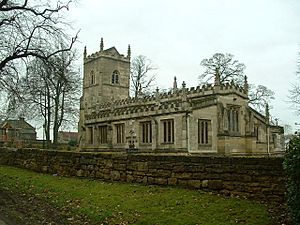St Wilfrid's Church, Hickleton facts for kids
Quick facts for kids St Wilfrid's Church, Hickleton |
|
|---|---|
 |
|
| 53°32′32″N 1°16′21″W / 53.5422°N 1.2726°W | |
| OS grid reference | SE 48300 05301 |
| Denomination | Church of England |
| Churchmanship | Anglo-Catholic |
| History | |
| Dedication | St. Wilfrid |
| Architecture | |
| Architect(s) | G F Bodley |
| Administration | |
| Parish | Goldthorpe with Hickleton |
| Diocese | Sheffield |
| Province | York |
St Wilfrid's Church in Hickleton is a historic church belonging to the Church of England. It is located in the village of Hickleton, which is close to Doncaster in South Yorkshire, England. This beautiful old building has been a place of worship for many centuries.
Contents
A Look at the Church's History
The church building you see today, St Wilfrid's, is found just south of the main A635 road as you enter Hickleton from the east. Experts who have studied the site believe the current church was built around the year 1150. However, there might have been an even older church on this spot during Saxon times, long before 1066.
What Makes it Special?
St Wilfrid's Church is considered a very important historical building. It has a special "Grade I listed" status. This means it is one of the most important historic buildings in England and is protected.
The church has some amazing old features. For example, the arch that leads into the chancel (the part of the church where the altar is) is a great example of Norman architecture. This style was popular in England after the Norman Conquest in 1066. It shows that the church originally had a simple design, with just a small main area (called the nave) and the chancel.
How the Church Grew Over Time
Later, around the year 1300, the western part of the nave and the porch (the entrance area) were added. This shows how the church slowly grew bigger over the centuries.
The church's tower was built in a style called "Perpendicular Gothic." This style was common in England from the late 1300s to the 1500s. The tower is made from local stones like Magnesian limestone and sandstone. It might have been added around 1386. This was when the church and its lands were given to the Monk Bretton Priory, a type of monastery, by the Archbishop of York, Alexander Neville. This gift happened after the priory had been damaged by a fire.
Important Repairs and Changes
Over its long history, St Wilfrid's Church has had several major repair and improvement projects. These are often called "restorations."
Victorian Era Restoration
The first big restoration happened between 1876 and 1888. This work was overseen by a famous architect named George Frederick Bodley. During this time, a new north aisle (a side section of the church) and a sacristry (a room where priests prepare) were added. The roof was also raised and repaired. The sanctuary, the area around the altar, was paved with beautiful marble. New screens were also put in place to surround the altar.
Modern Repairs for Stability
More extensive work took place in the 1980s. At that time, the church building was in serious trouble because of a geological fault (a crack in the earth's crust) that caused it to lean dangerously. To fix this, a strong concrete base was put under the church's foundations. This special base has hydraulic jacks built into it. These jacks can be used to adjust the building and keep it straight if the ground moves again in the future.
The Lychgate and Its Skulls
To the north-west of the church, there is a special gate called a lychgate. This type of gate was traditionally used as a covered entrance to a churchyard, where coffins would rest before a burial.
A Curious Feature
This particular lychgate has a very unusual feature: three human skulls are set behind a metal grille. Above them, there are words written in both Latin and English: "Today for me, Tomorrow for thee." This phrase is a reminder that everyone will eventually die.
There are some local stories about where these skulls came from. However, it is more likely that they were placed there by Lord Halifax (the 2nd Viscount) as a "memento mori." A memento mori is an object that reminds people of death and how short life is. The two skulls on the outside are real, but the one in the middle is a stone. The original middle skull was stolen in the 1980s and replaced with a stone.
See also
- Grade I listed buildings in South Yorkshire
- Listed buildings in Hickleton

